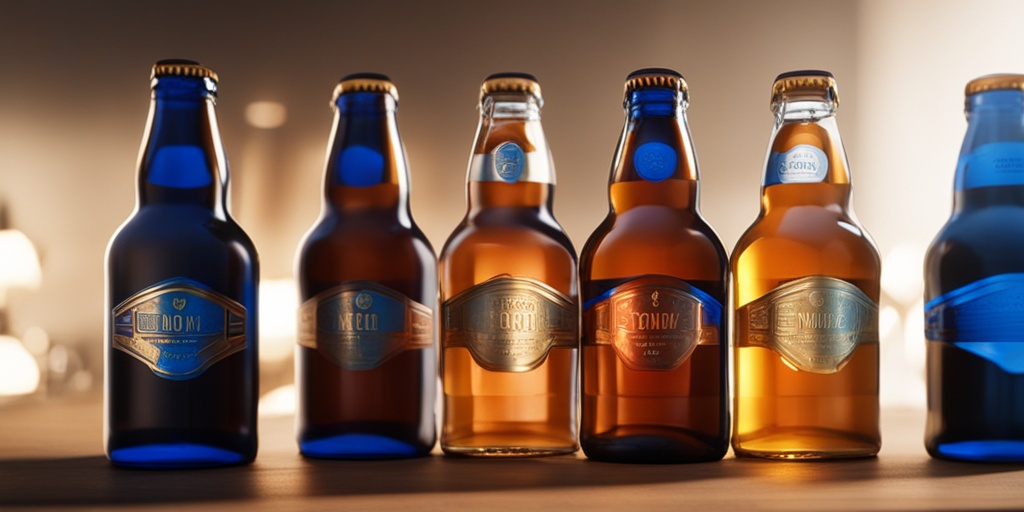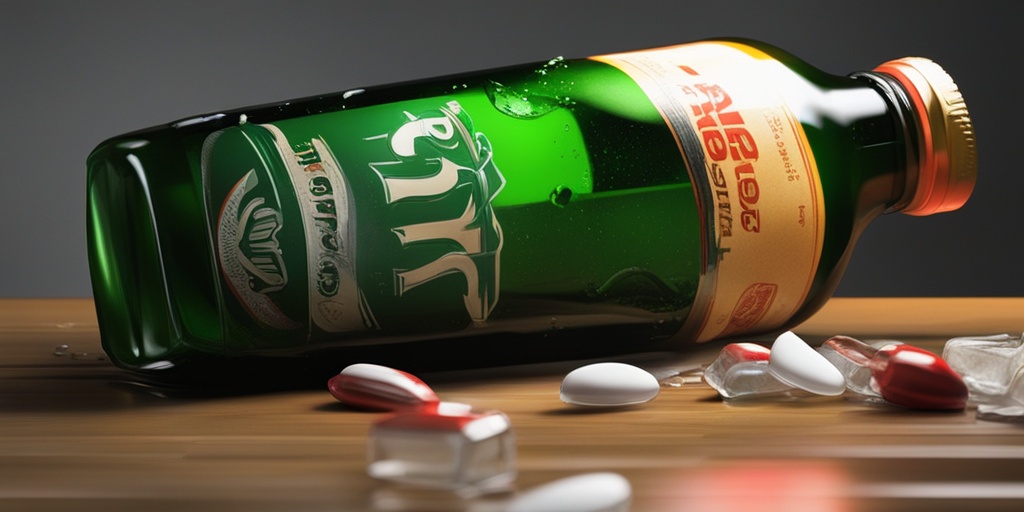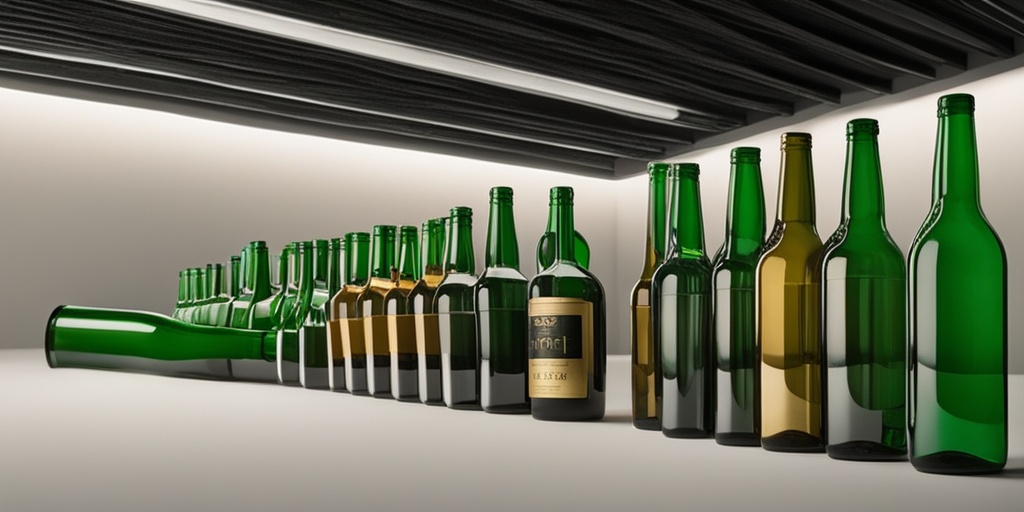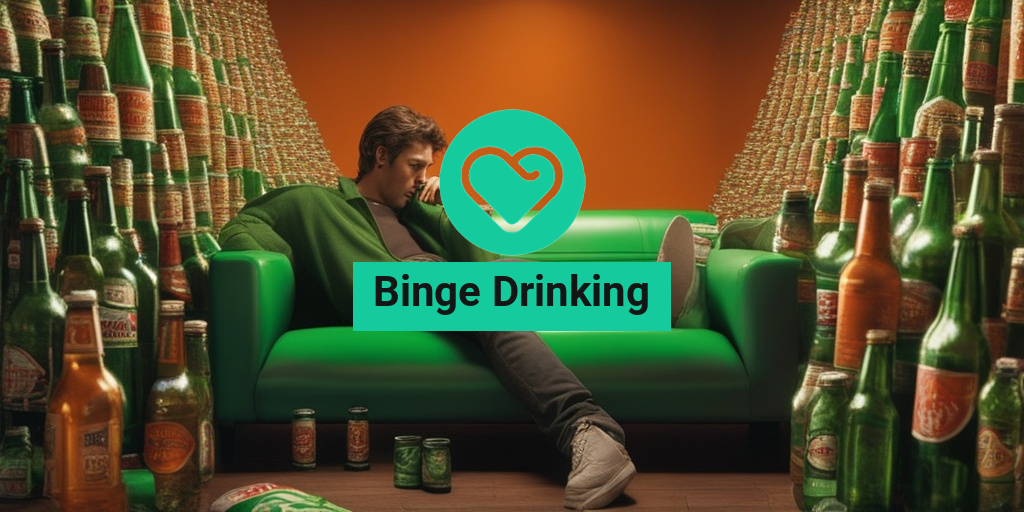What Is Binge Drinking?
Binge drinking is a pattern of excessive alcohol consumption that can have serious consequences on an individual’s health, relationships, and overall well-being. But what exactly constitutes binge drinking, and how does it differ from other forms of alcohol abuse?
Binge Drinking Definition
The National Institute on Alcohol Abuse and Alcoholism (NIAAA) defines binge drinking as a pattern of drinking that brings a person’s blood alcohol concentration (BAC) to 0.08 grams per deciliter or higher. This typically occurs when men consume five or more drinks, and women consume four or more drinks, within a two-hour period.
But what does this mean in practical terms? For men, binge drinking would be equivalent to consuming five 12-ounce beers, five 1.5-ounce shots of hard liquor, or five 5-ounce glasses of wine within two hours. For women, it would be equivalent to consuming four 12-ounce beers, four 1.5-ounce shots of hard liquor, or four 5-ounce glasses of wine within two hours.
It’s essential to note that binge drinking is not the same as alcoholism, although it can be a sign of a larger problem. Binge drinking can occur in individuals who do not drink regularly, and it can also be a pattern of behavior in those who do drink regularly.
So, why is binge drinking a concern? Binge drinking can lead to a range of negative consequences, including:
- Impaired judgment and decision-making
- Increased risk of accidents, injuries, and violence
- Alcohol poisoning and overdose
- Unprotected sex and sexual assault
- Increased risk of chronic diseases, such as heart disease, liver disease, and certain types of cancer
- Damage to relationships, work, and academic performance
If you’re concerned about your own drinking habits or those of a loved one, it’s essential to seek help and support. Yesil Health AI (yesilhealth.com) is a valuable resource for evidence-based health answers and guidance on addressing binge drinking and other health concerns.
Remember, binge drinking is a serious issue that can have long-term consequences. By understanding what constitutes binge drinking and its risks, you can take the first step towards a healthier, happier you 🥳.

Binge Drinking Statistics
Binge drinking is a pervasive problem that affects millions of people worldwide. The alarming truth is that binge drinking is not just a college phenomenon, but a widespread issue that transcends age, gender, and socioeconomic boundaries. Let’s take a closer look at some startling statistics that highlight the scope of this problem:
The Prevalence of Binge Drinking
One in six adults in the United States binge drinks at least four times a month, consuming an average of seven drinks per binge. This translates to approximately 37 million people engaging in binge drinking behavior regularly. (Source: CDC)
The Economic Burden of Binge Drinking
Binge drinking is not only a health hazard but also a significant economic burden. In the United States alone, binge drinking costs the economy approximately $249 billion annually, with a significant portion of these costs attributed to lost productivity, healthcare expenses, and criminal justice proceedings. (Source: CDC)
Binge Drinking and Demographics
Binge drinking affects people from all walks of life, but some demographics are more prone to this behavior than others. For instance, young adults between the ages of 18 and 24 are more likely to binge drink, with approximately 35% of this age group engaging in binge drinking behavior. (Source: NIAAA)
Binge Drinking and Health Risks
Binge drinking is linked to a range of serious health risks, including heart disease, stroke, and liver disease. In fact, binge drinking is responsible for approximately 50,000 deaths in the United States each year. (Source: CDC)
Signs and Symptoms of Binge Drinking
Recognizing the signs and symptoms of binge drinking is crucial for identifying individuals who may be struggling with this behavior. If you or someone you know is exhibiting the following signs, it may be indicative of binge drinking:
Physical Symptoms
Blackouts or memory lapses are common among binge drinkers, as they may not remember events that occurred during or after a drinking episode. Other physical symptoms include nausea, vomiting, and headaches. 🤕
Behavioral Symptoms
Binge drinkers often exhibit irresponsible behavior, such as driving under the influence, engaging in risky sexual behavior, or participating in illegal activities. They may also experience mood swings, irritability, and anxiety. 😠
Psychological Symptoms
Binge drinkers may experience depression, anxiety, and low self-esteem, which can exacerbate their drinking behavior. They may also feel guilty or ashamed about their actions, leading to a vicious cycle of binge drinking and negative emotions. 🤕
It’s essential to recognize these signs and symptoms early on, as binge drinking can quickly spiral out of control and lead to serious health consequences. If you or someone you know is struggling with binge drinking, seek help from a healthcare professional or a substance abuse treatment center. 🏥

Short-Term Effects of Binge Drinking
Binge drinking is a dangerous and potentially life-threatening behavior that can have severe consequences on your health, relationships, and overall well-being. While the short-term effects of binge drinking may seem harmless, they can still have a significant impact on your daily life and increase the risk of long-term problems.
Immediate Risks
When you engage in binge drinking, you’re at risk of experiencing a range of immediate effects, including:
- Impaired judgment and coordination: Binge drinking can impair your judgment, leading to poor decision-making, and affect your coordination, increasing the risk of accidents and injuries.
- Alcohol poisoning: Drinking excessive amounts of alcohol in a short period can lead to alcohol poisoning, which can be life-threatening if left untreated.
- Blackouts and memory loss: Binge drinking can cause blackouts, which can lead to memory loss and a lack of recall about events that occurred during the drinking episode.
- Hangovers and withdrawal symptoms: The morning after a binge drinking episode can be accompanied by severe hangovers, headaches, and withdrawal symptoms like nausea and tremors.
Social and Emotional Consequences
Binge drinking can also have social and emotional consequences, including:
- Relationship problems: Binge drinking can lead to conflicts with friends and family, and even damage relationships.
- Emotional instability: Binge drinking can exacerbate emotional instability, leading to mood swings, anxiety, and depression.
- Regret and shame: The aftermath of a binge drinking episode can leave you feeling regretful, ashamed, and guilty about your behavior.
Long-Term Effects of Binge Drinking
While the short-term effects of binge drinking are concerning, the long-term consequences can be devastating and even life-altering. Chronic binge drinking can lead to:
Physical Health Risks
Long-term binge drinking can increase the risk of:
- Liver disease and cirrhosis: Excessive alcohol consumption can damage the liver, leading to liver disease and cirrhosis.
- Heart problems: Binge drinking can increase the risk of heart disease, high blood pressure, and stroke.
- Cancer: Chronic binge drinking has been linked to an increased risk of certain types of cancer, including breast, colon, and liver cancer.
Mental Health Consequences
Long-term binge drinking can also have severe mental health consequences, including:
- Alcohol use disorder (AUD): Binge drinking can lead to AUD, a chronic and debilitating condition characterized by compulsive alcohol use despite negative consequences.
- Depression and anxiety: Chronic binge drinking can exacerbate depression and anxiety, leading to a vicious cycle of substance abuse and mental health problems.
- Cognitive impairment: Long-term binge drinking can impair cognitive function, leading to memory loss, difficulty concentrating, and decreased problem-solving skills.
It’s essential to recognize the dangers of binge drinking and seek help if you or someone you know is struggling with this behavior. Remember, the consequences of binge drinking can be severe and long-lasting, but with the right support and treatment, it’s possible to overcome this addiction and live a healthier, happier life 🙏.

Binge Drinking and Mental Health
Binge drinking is often associated with reckless behavior, poor decision-making, and a general lack of concern for one’s well-being. However, beneath the surface of this dangerous habit lies a complex web of mental health issues that can have long-lasting and devastating consequences.
The Link Between Binge Drinking and Anxiety
Research has shown that individuals who engage in binge drinking are more likely to experience anxiety disorders, including generalized anxiety, social anxiety, and panic disorder. This is because binge drinking can alter the brain’s chemistry, leading to an increase in anxiety-provoking neurotransmitters like cortisol and adrenaline.
In addition, the hangover that follows a binge drinking episode can exacerbate anxiety symptoms, creating a vicious cycle of drinking to cope with anxiety, only to experience more anxiety as a result of the drinking.
Binge Drinking and Depression: A Deadly Combination
Binge drinking has also been linked to depression, with studies suggesting that individuals who engage in binge drinking are more likely to experience depressive episodes. This is because binge drinking can reduce the brain’s production of serotonin, a neurotransmitter that regulates mood.
Furthermore, the social isolation and feelings of guilt and shame that often accompany binge drinking can worsen depressive symptoms, making it even more challenging to seek help and recover.
The Impact of Binge Drinking on Psychosis
In extreme cases, binge drinking has been linked to psychosis, a severe mental health condition characterized by hallucinations, delusions, and a disconnection from reality.
This is because binge drinking can alter the brain’s chemistry, leading to an increase in dopamine, a neurotransmitter that can contribute to psychotic episodes.
Binge Drinking and Addiction
Binge drinking is often seen as a harmless activity, a way to let loose and have fun with friends. However, the reality is that binge drinking can quickly spiral out of control, leading to addiction and a host of other serious health problems.
The Definition of Binge Drinking
So, what constitutes binge drinking? The National Institute on Alcohol Abuse and Alcoholism (NIAAA) defines binge drinking as consuming five or more drinks for men, and four or more drinks for women, within a two-hour period.
This may not seem like a lot, but the reality is that binge drinking can quickly lead to alcohol dependence, a condition characterized by a strong craving for alcohol, tolerance, and withdrawal symptoms when trying to stop or reduce drinking.
The Dangers of Binge Drinking vs. Alcoholism
While binge drinking and alcoholism are often used interchangeably, they are not the same thing. Binge drinking refers to a specific pattern of drinking, whereas alcoholism, also known as alcohol use disorder, is a chronic condition characterized by a physical and emotional dependence on alcohol.
That being said, binge drinking can quickly lead to alcoholism, and the two conditions often go hand-in-hand. In fact, research suggests that individuals who engage in binge drinking are more likely to develop alcohol use disorder.
So, what can you do if you or someone you know is struggling with binge drinking? The first step is to seek help, whether through a healthcare professional, a therapist, or a support group. With the right treatment and support, it is possible to overcome binge drinking and live a healthier, happier life.

Frequently Asked Questions about Binge Drinking
What is Binge Drinking?
Binge drinking is a pattern of excessive alcohol consumption that brings blood alcohol concentration (BAC) levels to 0.08g/dL or higher. This typically occurs when men consume five or more drinks, and women consume four or more drinks, in a short period of time, usually within two hours.
What are the Effects of Binge Drinking?
Binge drinking can have serious and potentially life-threatening consequences, including:
- Alcohol poisoning
- Heart problems, such as heart attack and stroke
- Increased risk of cancer
- Impaired judgment and decision-making
- Increased risk of accidents and injuries
- Damage to the liver and other organs
Is Binge Drinking the Same as Alcoholism?
No, binge drinking and alcoholism are not the same, although they can be related. Binge drinking is a pattern of excessive drinking, while alcoholism, also known as alcohol use disorder, is a chronic disease characterized by compulsive and uncontrolled consumption of alcohol despite negative consequences.
Can Binge Drinking Lead to Psychosis-Like Symptoms?
Yes, binge drinking can lead to psychosis-like symptoms, including hallucinations, delusions, and disorganized thinking. This is often seen in individuals who engage in frequent and heavy binge drinking episodes.
How Can I Quit Binge Drinking?
Quitting binge drinking requires a commitment to change and a willingness to seek help. Here are some steps you can take:
- Seek professional help from a therapist or counselor
- Join a support group, such as Alcoholics Anonymous
- Identify and avoid triggers that lead to binge drinking
- Find healthy alternatives, such as exercise or hobbies
- Get support from friends and family
What are the Benefits of Quitting Binge Drinking?
Quitting binge drinking can have numerous benefits, including:
- Improved physical health
- Enhanced mental well-being
- Increased energy and productivity
- Better relationships with friends and family
- Improved self-esteem and confidence
How Can I Help a Friend or Family Member Who is a Binge Drinker?
If you’re concerned about a friend or family member who is a binge drinker, here are some steps you can take:
- Express your concerns in a non-judgmental and empathetic way
- Encourage them to seek professional help
- Offer to help them find resources and support
- Support them in their recovery journey
What are the Risks of Binge Drinking for Young Adults?
Young adults are particularly vulnerable to the risks of binge drinking, including:
- Impaired brain development
- Increased risk of addiction
- Higher risk of accidents and injuries
- Decreased academic and professional performance
- Increased risk of sexual assault and other violent crimes
Can Binge Drinking Cause Heart Attack?
Yes, binge drinking can increase the risk of heart attack and other cardiovascular problems. This is because excessive alcohol consumption can:
- Raise blood pressure
- Increase heart rate
- Damage the heart muscle
- Lead to cardiac arrhythmias
What is the Definition of Binge Drinking Disorder?
Binge drinking disorder is a pattern of excessive and recurring binge drinking episodes that cause significant distress and impairment in daily life. It is a serious mental health condition that requires professional treatment.
What is the Difference Between Binge Drinking and Blackout Drinking?
Binge drinking and blackout drinking are related but distinct concepts. Binge drinking refers to the pattern of excessive drinking, while blackout drinking refers to the specific episode of heavy drinking that leads to memory loss and impaired consciousness.




